高中英语情态动词讲解
高中英语语法讲义-情态动词
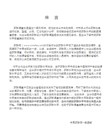
He may [might] be writing a letter. 他可能在写信。
They may [might] be going abroad next month. 他们可能在下个月出国。
③ 后接动词完成式,表示对过去可能发生的事进行推测:
另外,could还可与表示感知的动词(如see, hear, smell, taste, feel, understand等)连用表示的特定能力:
Looking down from the plane, we could see lights on the runway. 从飞机上向下看,我们可以看见机场跑道上的点点灯火。
2) 表示委婉的批评或责备:
You might have made greater progress. 你的进步本来可更大一些的。
You might at least have answered my letter. 你至少可以回我一封信嘛。
③ 表示“差点儿就要”:
I could have died laughing. 我差点儿笑死了。
二、may与might的用法
1. 表示允许
注意以下两种情况:
(1) 表示请求允许(即请求别人允许自己做某事),两者都可用,只是 might 表示的语气较委婉(但并不表示过去):
May [Might] I sit here? 我可以坐在这里吗?
1) 表示过去某事可能发生而实际上却并没发生:
A lot of men died who might have been saved.很多人本来可以获救的却死了。
It was really very dangerous. I might have killed myself. 那真的是太危险了,我差点没命了。
情态动词详解
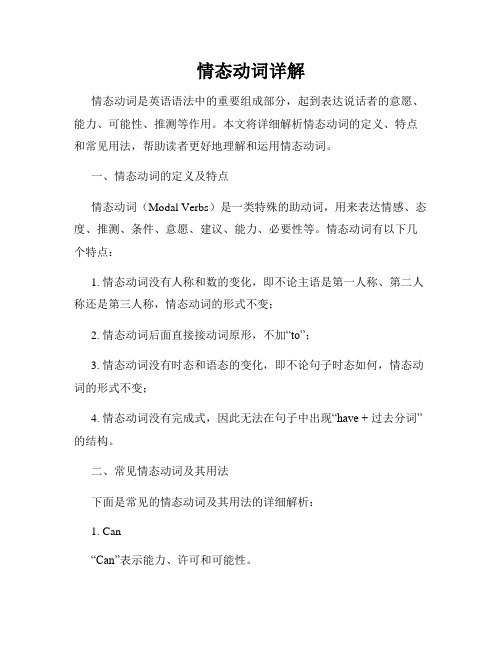
情态动词详解情态动词是英语语法中的重要组成部分,起到表达说话者的意愿、能力、可能性、推测等作用。
本文将详细解析情态动词的定义、特点和常见用法,帮助读者更好地理解和运用情态动词。
一、情态动词的定义及特点情态动词(Modal Verbs)是一类特殊的助动词,用来表达情感、态度、推测、条件、意愿、建议、能力、必要性等。
情态动词有以下几个特点:1. 情态动词没有人称和数的变化,即不论主语是第一人称、第二人称还是第三人称,情态动词的形式不变;2. 情态动词后面直接接动词原形,不加“to”;3. 情态动词没有时态和语态的变化,即不论句子时态如何,情态动词的形式不变;4. 情态动词没有完成式,因此无法在句子中出现“have + 过去分词”的结构。
二、常见情态动词及其用法下面是常见的情态动词及其用法的详细解析:1. Can“Can”表示能力、许可和可能性。
能力:用于表达某人在某方面具有的能力或技能。
例句:He can speak three languages.许可:用于征求或给予许可。
例句:Can I borrow your pen, please?可能性:用于表达可能发生的情况。
例句:It can rain tomorrow.2. Could“Could”是Can的过去式,表示过去或虚拟条件下的能力、许可和可能性。
能力(过去):用于表达过去具备的能力或技能。
例句:When I was young, I could run very fast.许可(过去):用于过去征求或给予许可。
例句:Could I use your phone yesterday?可能性(虚拟条件):用于表示虚拟情况下的可能性。
例句:If I had enough money, I could travel around the world.3. May“May”表示允许、可能性、祝愿和推测。
允许:用于征求或给予许可。
例句:May I come in?可能性:用于表达主观推测的可能性。
高中英语情态动词讲解
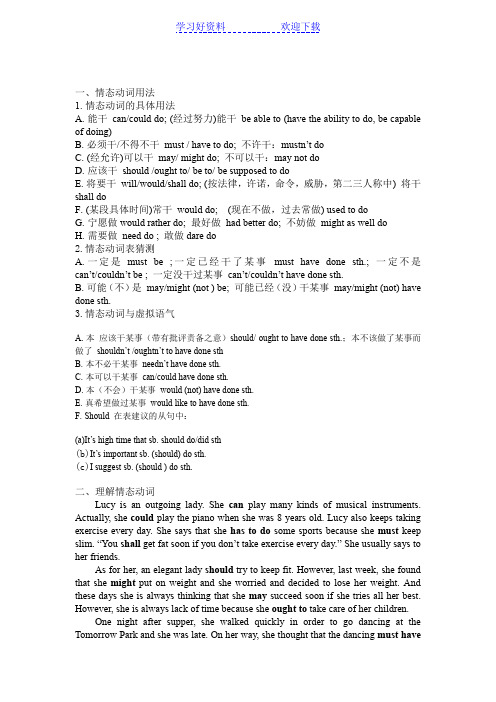
一、情态动词用法1.情态动词的具体用法A.能干can/could do; (经过努力)能干be able to (have the ability to do, be capable of doing)B.必须干/不得不干must / have to do; 不许干:mustn’t doC.(经允许)可以干may/ might do; 不可以干:may not doD.应该干should /ought to/ be to/ be supposed to doE.将要干will/would/shall do; (按法律,许诺,命令,威胁,第二三人称中) 将干shall doF.(某段具体时间)常干would do; (现在不做,过去常做) used to doG.宁愿做would rather do; 最好做had better do; 不妨做might as well doH.需要做need do ; 敢做dare do2.情态动词表猜测A.一定是must be ;一定已经干了某事must have done sth.; 一定不是can’t/couldn’t be ; 一定没干过某事can’t/couldn’t have done sth.B.可能(不)是may/might (not ) be; 可能已经(没)干某事may/might (not) have done sth.3.情态动词与虚拟语气A.本应该干某事(带有批评责备之意)should/ ought to have done sth.;本不该做了某事而做了shouldn’t /oughtn’t to have done sthB.本不必干某事needn’t have done sth.C.本可以干某事can/could have done sth.D.本(不会)干某事would (not) have done sth.E.真希望做过某事would like to have done sth.F.Should 在表建议的从句中:(a)It’s high time that sb. should do/did sth(b)It’s important sb. (should) do sth.(c)I suggest sb. (should ) do sth.二、理解情态动词Lucy is an outgoing lady. She can play many kinds of musical instruments. Actually, she could play the piano when she was 8 years old. Lucy also keeps taking exercise every day. She says that she has to do some sports because she must keep slim. “You shall get fat soon if you don’t take exercise every day.” She usually says to her friends.As for her, an elegant lady should try to keep fit. However, last week, she found that she might put on weight and she worried and decided to lose her weight. And these days she is always thinking that she may succeed soon if she tries all her best. However, she is always lack of time because she ought to take care of her children.One night after supper, she walked quickly in order to go dancing at the Tomorrow Park and she was late. On her way, she thought that the dancing must havebegun, and the coach could have taught or shown many new moves. She was afraid that her friends might have left before she got there. She was regretful then. She should have had supper earlier, or she could have taken a taxi, and indeed she needn’t have taken a bath in advance. When she reached the park finally, she found nobody was there. She remembered suddenly that it had been reported on the radio that there would be a heavy rain that night.思考每个加黑的情态动词的含义;什么时候用情态动词的完成式,分别表达什么意思。
高中英语语法讲解: 情态动词

高中英语语法讲解:情态动词概述1.共有10个情态动词:can/could, may/might, will/would, shall, should, ought to, must;2个半情态动词need, dare2.特点:(1)情态动词后加动词原形(即不带to的不定式)一起构成谓语;(2)没有人称和数的变化;(3)多数情态动词有过去式,但其过去式有时并不表示时态,而只起“委婉或不确定语气”的作用。
Would you do me a favour? She may/might be watering the flowers now.3.情态动词在句子中可发挥不同作用,如表能力,表责任与义务,表推测,表征求允许,表请求,表建议,表语气态度等等He can/could run 100 meters in 11 seconds.You should/ought to/must work hard to win a gold medal.Can/Could/May/Might I watch the Olympics tonight?Will/Can/Could/Would you help me with my training?He might/may/could/should/ought to/will/must watch the football match tonight.I suggest that you should watch the opening ceremony.Can this be true?4.情态动词+do 表对一般现在或将来情况的推测情态动词+ be doing 表对正在发生的事情的推测情态动词+have done 表对过去已经发生的事情的推测一、can/could 的用法1.表能力(1) can do现在一般的能力(2) could do过去一般的能力(3) could have done过去有能力做但没做具体某事(4)was/were able to do = managed to do/ succeeded in doing 过去有能力做且做了具体某事。
情态动词高中知识点高三

情态动词高中知识点高三情态动词是一类具有特殊意义和用法的动词,它们在句子中一般与实义动词连用,表示说话人的推测、命令、请求、建议等情态。
在高中英语学习中,掌握情态动词的正确用法至关重要。
本文将介绍情态动词的相关知识点,帮助高三学生更好地运用这一语法现象。
一、情态动词的定义情态动词,又称情态助动词,是用来表示说话人对某种动作或状态的态度、推测、可能性、能力、意愿、义务等情态的一类特殊动词。
常见的情态动词包括can、could、may、might、must、shall、should、will、would等。
二、情态动词的用法1. 表示能力情态动词can表示某人具有能力或可能做某事,could用于过去说法。
例如:- She can speak three languages fluently.(她能说流利的三种语言)- He could lift the heavy boxes when he was younger.(他年轻时能搬起这些沉重的箱子)2. 表示推测和可能性情态动词may、might、could用于表示推测和可能性。
may用于表示较为肯定的推测,might和could表示推测的可能性较小。
例如:- The weather is cloudy, it may rain later.(天气多云,可能会下雨)- He might be late for the meeting.(他可能会迟到会议)3. 表示义务和建议情态动词must表示说话人对某种行为具有强烈的责任感或坚决要求,should表示建议。
例如:- We must obey the laws of the country.(我们必须遵守国家的法律)- You should apologize to your friend for your mistake.(你应该为你的错误向朋友道歉)4. 表示许可和请求情态动词can、may、could用于表示允许和请求。
情态动词知识点总结高中

情态动词知识点总结高中情态动词是英语中一个重要的语法现象,它们能够表达说话者的情感、态度、意愿等,以及表达说话者对事件的推测、猜测、可能性等。
了解情态动词的用法,能够帮助我们更准确地表达自己的意思,也有助于我们理解他人的意图。
本文将对情态动词的概念、用法、以及常见的情态动词进行总结和归纳,以便于读者更深入地理解情态动词的使用。
一、情态动词的概念情态动词(Modal Verb)是一类特殊的助动词,用来表示说话者的情感、态度、意愿等,以及表达说话者对事件的推测、猜测、可能性等。
情态动词通常用于句子的前面,后面跟动词原形,用来构成不同的语法结构和表达不同的含义。
英语中常见的情态动词有can、could、may、might、must、shall、should、will、would、ought to等。
这些情态动词具有一些共同的特点,比如不能独立完成谓语,后面必须跟动词原形;在疑问句和否定句中,情态动词的位置要发生变化等。
二、情态动词的用法1. 表示能力和可能性can与could表示说话者的能力或者对某种事情的可能性,其中can用于现在时,could用于过去时。
比如:I can speak Spanish.(我会说西班牙语。
)She could swim when she was five.(她五岁的时候就会游泳。
)may与might也表示可能性,may 用于现在时,might 用于过去时。
比如:It may rain tomorrow.(明天可能会下雨。
)I thought she might come.(我以为她可能会来。
)2. 表示请求和建议will与would可以表示请求,will用于肯定句,would用于否定句和疑问句。
比如:Will you please help me?(你能帮帮我吗?)I would like to go with you.(我想和你一起去。
)shall与should也可以表示请求或者建议,should更多地表示建议。
情态动词知识点
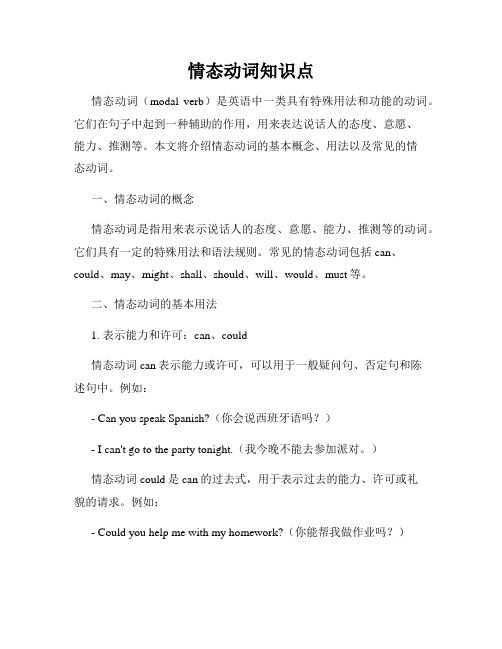
情态动词知识点情态动词(modal verb)是英语中一类具有特殊用法和功能的动词。
它们在句子中起到一种辅助的作用,用来表达说话人的态度、意愿、能力、推测等。
本文将介绍情态动词的基本概念、用法以及常见的情态动词。
一、情态动词的概念情态动词是指用来表示说话人的态度、意愿、能力、推测等的动词。
它们具有一定的特殊用法和语法规则。
常见的情态动词包括can、could、may、might、shall、should、will、would、must等。
二、情态动词的基本用法1. 表示能力和许可:can、could情态动词can表示能力或许可,可以用于一般疑问句、否定句和陈述句中。
例如:- Can you speak Spanish?(你会说西班牙语吗?)- I can't go to the party tonight.(我今晚不能去参加派对。
)情态动词could是can的过去式,用于表示过去的能力、许可或礼貌的请求。
例如:- Could you help me with my homework?(你能帮我做作业吗?)- She could run very fast when she was young.(她年轻时能跑得很快。
)2. 表示可能性和推测:may、might情态动词may和might用于表示可能性或推测,表示事物发生的可能性更大。
might的语气较虚弱,使用较少。
例如:- It may rain tomorrow, so take an umbrella with you.(明天可能会下雨,所以带把伞。
)- He might be busy.(他可能很忙。
)3. 表示义务和建议:shall、should情态动词shall用于第一人称和第三人称中,表示义务或将来的行为。
should用于各种人称中,表示建议或应该的动作。
例如:- Shall I open the window?(我应该打开窗户吗?)- You should eat more fruits and vegetables.(你应该多吃水果和蔬菜。
情态动词全部知识点总结
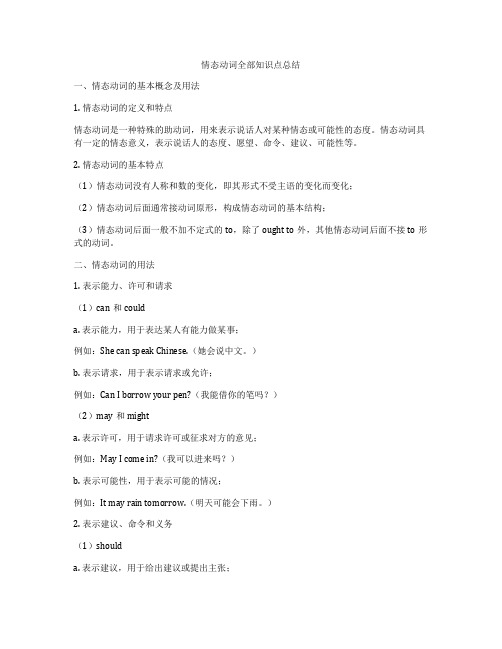
情态动词全部知识点总结一、情态动词的基本概念及用法1. 情态动词的定义和特点情态动词是一种特殊的助动词,用来表示说话人对某种情态或可能性的态度。
情态动词具有一定的情态意义,表示说话人的态度、愿望、命令、建议、可能性等。
2. 情态动词的基本特点(1)情态动词没有人称和数的变化,即其形式不受主语的变化而变化;(2)情态动词后面通常接动词原形,构成情态动词的基本结构;(3)情态动词后面一般不加不定式的to,除了ought to外,其他情态动词后面不接to形式的动词。
二、情态动词的用法1. 表示能力、许可和请求(1)can和coulda. 表示能力,用于表达某人有能力做某事;例如:She can speak Chinese.(她会说中文。
)b. 表示请求,用于表示请求或允许;例如:Can I borrow your pen?(我能借你的笔吗?)(2)may和mighta. 表示许可,用于请求许可或征求对方的意见;例如:May I come in?(我可以进来吗?)b. 表示可能性,用于表示可能的情况;例如:It may rain tomorrow.(明天可能会下雨。
)2. 表示建议、命令和义务(1)shoulda. 表示建议,用于给出建议或提出主张;例如:You should see a doctor.(你应该去看医生。
)b. 表示义务,用于表示责任或义务;例如:We should obey the law.(我们应该遵守法律。
)(2)ought toa. 表示责任或义务,用于表示应该做的事情;例如:You ought to apologize to her.(你应该向她道歉。
)3. 表示可能性和必然性(1)musta. 表示必然性,用于表示肯定的推断或必然的结论;例如:He must be at home now.(他现在一定在家。
)b. 表示义务,用于表示应遵守的规定或责任;例如:Students must wear school uniforms.(学生必须穿校服。
情态动词知识点大总结
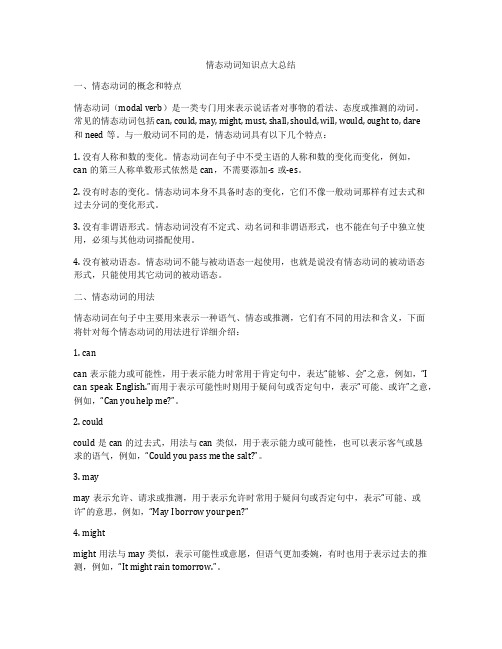
情态动词知识点大总结一、情态动词的概念和特点情态动词(modal verb)是一类专门用来表示说话者对事物的看法、态度或推测的动词。
常见的情态动词包括 can, could, may, might, must, shall, should, will, would, ought to, dare和need等。
与一般动词不同的是,情态动词具有以下几个特点:1. 没有人称和数的变化。
情态动词在句子中不受主语的人称和数的变化而变化,例如,can的第三人称单数形式依然是can,不需要添加-s或-es。
2. 没有时态的变化。
情态动词本身不具备时态的变化,它们不像一般动词那样有过去式和过去分词的变化形式。
3. 没有非谓语形式。
情态动词没有不定式、动名词和非谓语形式,也不能在句子中独立使用,必须与其他动词搭配使用。
4. 没有被动语态。
情态动词不能与被动语态一起使用,也就是说没有情态动词的被动语态形式,只能使用其它动词的被动语态。
二、情态动词的用法情态动词在句子中主要用来表示一种语气、情态或推测,它们有不同的用法和含义,下面将针对每个情态动词的用法进行详细介绍:1. cancan表示能力或可能性,用于表示能力时常用于肯定句中,表达“能够、会”之意,例如,“I can speak English.”而用于表示可能性时则用于疑问句或否定句中,表示“可能、或许”之意,例如,“Can you help me?”。
2. couldcould是can的过去式,用法与can类似,用于表示能力或可能性,也可以表示客气或恳求的语气,例如,“Could you pass me the salt?”。
3. maymay表示允许、请求或推测,用于表示允许时常用于疑问句或否定句中,表示“可能、或许”的意思,例如,“May I borrow your pen?”4. mightmight用法与may类似,表示可能性或意愿,但语气更加委婉,有时也用于表示过去的推测,例如,“It might rain tomorrow.”。
高一常见知识点梳理情态动词与情态副词
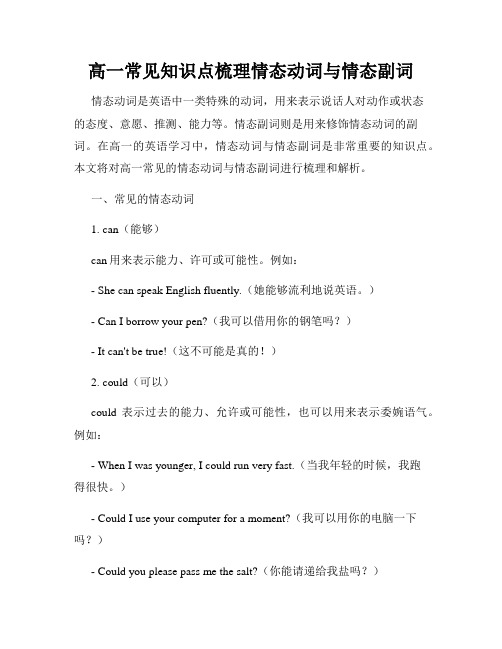
高一常见知识点梳理情态动词与情态副词情态动词是英语中一类特殊的动词,用来表示说话人对动作或状态的态度、意愿、推测、能力等。
情态副词则是用来修饰情态动词的副词。
在高一的英语学习中,情态动词与情态副词是非常重要的知识点。
本文将对高一常见的情态动词与情态副词进行梳理和解析。
一、常见的情态动词1. can(能够)can用来表示能力、许可或可能性。
例如:- She can speak English fluently.(她能够流利地说英语。
)- Can I borrow your pen?(我可以借用你的钢笔吗?)- It can't be true!(这不可能是真的!)2. could(可以)could表示过去的能力、允许或可能性,也可以用来表示委婉语气。
例如:- When I was younger, I could run very fast.(当我年轻的时候,我跑得很快。
)- Could I use your computer for a moment?(我可以用你的电脑一下吗?)- Could you please pass me the salt?(你能请递给我盐吗?)3. may(可能)may表示可能性、允许或请求的委婉语气。
例如:- It may rain tomorrow, so take your umbrella with you.(明天可能会下雨,所以记得带上雨伞。
)- May I go to the bathroom?(我可以去洗手间吗?)- May I have another piece of cake, please?(请问我可以再来一块蛋糕吗?)4. might(可能)might用来表示较小的可能性或建议。
例如:- It might rain later, so you should bring a raincoat.(天气可能会下雨,所以你应该带一件雨衣。
)- You might want to try the new restaurant downtown.(你可以试试市区的那家新餐厅。
高中英语情态动词讲解

之前,疑问句中, 情态动词则在主语之前。
I can see you. Come here. 我能看见你,过来吧。 He must have been away. 他一定走了。 What can I do for you? 我能帮你吗? How dare you treat us like that! 你怎能那样对待我们!
① I should think it would be better to try it again. 我倒是认为最好再试一试。 ② You are mistaken, I should say. 依我看,你是搞错了。 ③ I should advise you not to do that. 我倒是劝你别这样做。 ④ This is something I should have liked to ask you. 这是我本来想问 你的。
都表示建议、询问、请求等。 e.g.,
Would/ Will you mind opening the windows? I would / will do anything for you , sir.
有时甚至只能用would而不用will
e.g., I would like….
Would you like….? They would love…. He would rather ……
5. 情态动词没有非谓语形式,即没有不定式,分词等形式。
只作情态动词的 can/could, may/might, ought to, must 可情态可实义的 need, dare 可情态可助动词的 shall/should, will/would 相当于情态动词的 have to
位置:
情态动词在句中放在谓语动词之前, 谓语动词前若有助动词,则在助动词
高中英语情态动词讲解

4) cannot (help\choose)but +动词原形 “不得不,只能” I cannot help but tell her the truth. cannot help it “控制不住,没有办法 ” cannot … too…… “无论怎样也不为过” I cannot thank you too much cannot help doing sth 禁不住做某事 5)couldn„t +动词原形+比较级 (再……不过了) It couldn't be better. I couldn't agree with you more.
A. could have stayed B. could stay C. would stay D. must have stayed
7. The weather turned out to be fine yesterday. I__ the trouble to carry my umbrella with me . A. should have taken B. could have taken C. needn't have taken D. mustn't have taken 8. He paid for a seat, when he__ have entered free. A. could B. would C. must D. need
3. ---- What does the sign over there read? ---- "No person ______smoke or carry a lighted cigarette,cigar or pipe in this area." A.will B.may C.shall D. must 4. John, look at the time. _______ you play the piano at such a late hour? A. Must B. Can C. May D. Need 5. You can‟t imagine that a well-behaved gentleman ____ be so rude to a lady. A. might B. need C. should D. would
高中英语语法:情态动词的详解大总结

高中英语语法:情态动词的详解大总结一、can和could1、can的用法(1)表示体力和脑力方面的能力。
(2)表示对现在的动作或状态进行主观的猜测,主要用在否定句和疑问句中。
(3)表示可能性,理论上的可能性,意为“有时候可能会”,可用于肯定句。
(4)表示允许,意思与may接近。
(5)表示说话人的推测、怀疑、惊异、猜测或不肯定等,主要用于否定句、疑问句或感叹句中。
(6)can的特殊句型cannot…too / enough表示“无论怎么...也不过分”“越...越好”cannot but+ do sth.表示“不得不,只好”2、could的用法(1)表示能力,指的是过去时间。
(2)表示允许,指的是过去时间。
(3)表示可能,可以指过去时间,也可以指现在时间,表示语气缓和。
(4)委婉客气地提出问题或陈述看法,指的是现在时间。
主要用于疑问句,回答时用can。
3、can与could的区别can表推测时只用于否定句和疑问句(could无此限制)。
couldn’t的可能性比can’t小。
4、can与be able to的区别(1)现在时:无区别,但后者不常用。
(2)完成时;can没有完成时,此时要用have (has,had)been able to。
(3)将来时:can没有将来时,要用will be able to。
(4)过去时:could表示一般能力,was/were able to 表示在具体场合通过努力成功做成某事的能力。
二、may 和might1、may的用法(1)表示询问或说明一件事可不可以做。
(2)表示一件事或许会发生或某种情况可能会存在,通常用在肯定句和否定句中。
注意:表示可能性时,can’t语气强,表示“不可能”,may not语气弱,表示“可能不”。
2、might的用法(1)表示询问或允许,指的是过去时间。
(2)表示可能发生的事,可以指过去时间,也可以指现在时间,语气更加不肯定,可能性比may小一些。
情态动词知识点总结

情态动词知识点总结情态动词是英语中的一类特殊动词,用于表达说话人的态度、观点或情感。
情态动词具有一些独特的语法和用法规则,掌握了这些规则,我们就能更准确地表达自己的意思。
本文将对情态动词的知识点进行总结,以帮助读者加深对该语法现象的理解。
一、情态动词的定义和特点情态动词(modal verbs)是英语中的一类特殊动词,用于表示说话人的意愿、可能性、许可、推测、建议、命令等情态。
情态动词有一些独特的特点:1. 情态动词没有人称和数的变化。
即不论主语是什么,情态动词的形式都保持不变。
2. 情态动词后面接动词原形(除了 ought to 外)。
3. 情态动词本身没有时态和语态的变化,通过与其他动词的搭配来表达时态和语态。
4. 情态动词不能单独用作谓语,必须与其他动词搭配使用。
二、常见的情态动词及其用法下面是常见的情态动词及其用法的详细介绍:1. can表示能力、许可或可能性。
例如:- I can swim.(我会游泳。
)- Can I borrow your pen?(我能借用你的笔吗?)- It can be difficult to learn a new language.(学习一门新语言可能会很困难。
)2. could表示过去或虚拟的能力、许可或可能性。
例如:- When I was young, I could run very fast.(当我年轻的时候,我跑得很快。
)- If I had more time, I could study abroad.(如果我有更多时间,我可以出国留学。
)- Could you help me with this problem?(你能帮我解决这个问题吗?)3. may表示可能性、许可或问询。
例如:- It may rain tomorrow.(明天可能会下雨。
)- May I use your phone?(我可以用一下你的手机吗?)- May I ask you a question?(我可以问你一个问题吗?)4. might表示可能性,用法与 may 相似。
高中英语知识点归纳情态动词与情态副词的区别与用法
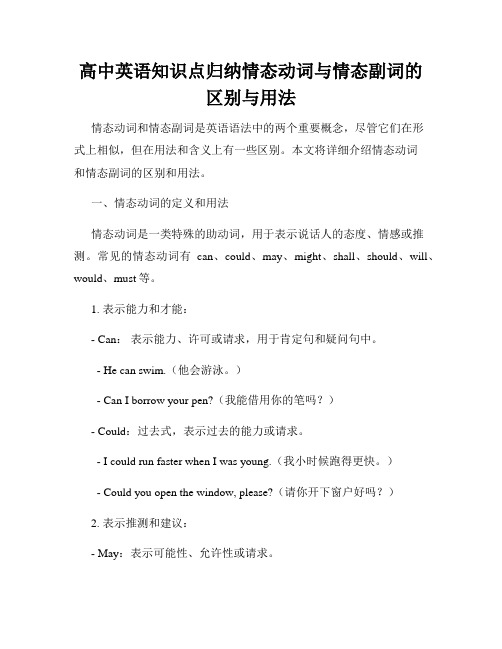
高中英语知识点归纳情态动词与情态副词的区别与用法情态动词和情态副词是英语语法中的两个重要概念,尽管它们在形式上相似,但在用法和含义上有一些区别。
本文将详细介绍情态动词和情态副词的区别和用法。
一、情态动词的定义和用法情态动词是一类特殊的助动词,用于表示说话人的态度、情感或推测。
常见的情态动词有can、could、may、might、shall、should、will、would、must等。
1. 表示能力和才能:- Can:表示能力、许可或请求,用于肯定句和疑问句中。
- He can swim.(他会游泳。
)- Can I borrow your pen?(我能借用你的笔吗?)- Could:过去式,表示过去的能力或请求。
- I could run faster when I was young.(我小时候跑得更快。
)- Could you open the window, please?(请你开下窗户好吗?)2. 表示推测和建议:- May:表示可能性、允许性或请求。
- It may rain tomorrow.(明天可能会下雨。
)- May I use your phone?(我可以用一下你的手机吗?)- Might:表示较小的可能性或社交礼貌。
- He might be at home.(他可能在家。
)- Might I have a glass of water, please?(我可以请你倒杯水吗?)3. 表示义务和建议:- Shall:主要用于疑问句或表示请求或建议。
- Shall we go now?(我们现在走吗?)- You shall do your homework.(你必须完成作业。
)- Should:表示应该、建议或责任。
- You should apologize.(你应该道歉。
)- She should study harder.(她应该更加努力学习。
)4. 表示必须和命令:- Must:表示必须、必要或断定。
高中英语知识点归纳情态动词和实义动词的用法讲解
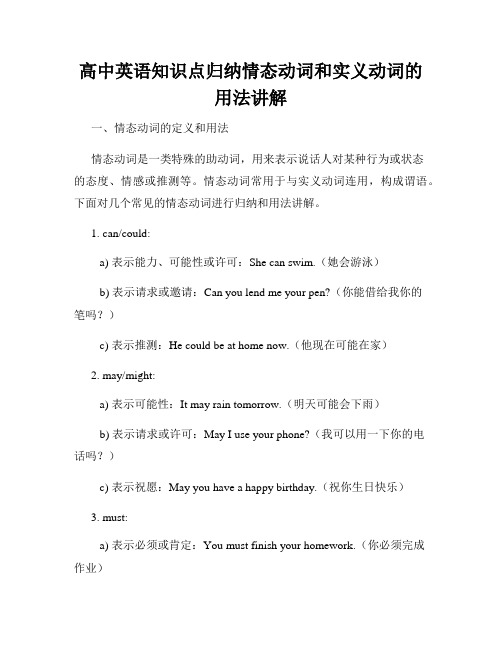
高中英语知识点归纳情态动词和实义动词的用法讲解一、情态动词的定义和用法情态动词是一类特殊的助动词,用来表示说话人对某种行为或状态的态度、情感或推测等。
情态动词常用于与实义动词连用,构成谓语。
下面对几个常见的情态动词进行归纳和用法讲解。
1. can/could:a) 表示能力、可能性或许可:She can swim.(她会游泳)b) 表示请求或邀请:Can you lend me your pen?(你能借给我你的笔吗?)c) 表示推测:He could be at home now.(他现在可能在家)2. may/might:a) 表示可能性:It may rain tomorrow.(明天可能会下雨)b) 表示请求或许可:May I use your phone?(我可以用一下你的电话吗?)c) 表示祝愿:May you have a happy birthday.(祝你生日快乐)3. must:a) 表示必须或肯定:You must finish your homework.(你必须完成作业)b) 用于反问句,表示强烈的建议或命令:Must I go now?(我现在必须离开吗?)4. shall/should:a) shall用于第一人称,表示将来的意愿、承诺、建议或命令:I shall help you with the housework.(我会帮你打扫房间)b) should用于其他人称,表示应该、建议或推测:You should exercise regularly.(你应该经常锻炼)5. will/would:a) 表示将来的意愿、决心或承诺:I will visit my grandparents this weekend.(这个周末我将去看望我的祖父母)b) would用于过去的愿望、习惯或客气的请求:He would always help others when he was young.(他年轻时总是帮助别人)二、实义动词的定义和用法实义动词是指表示实际动作或状态的动词。
高中英语情态动词详解
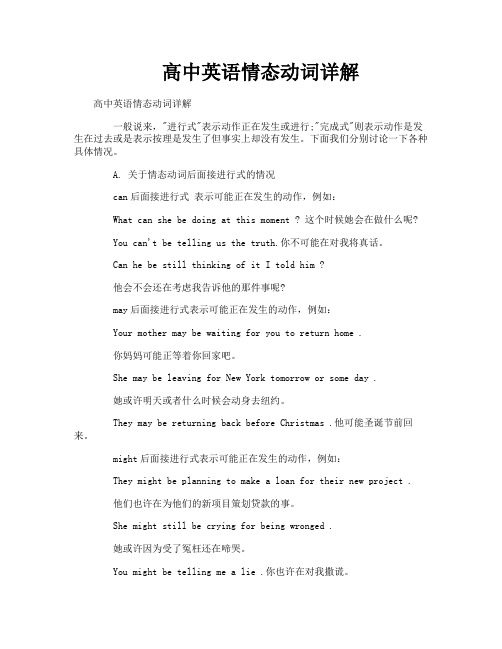
高中英语情态动词详解高中英语情态动词详解一般说来,"进行式"表示动作正在发生或进行;"完成式"则表示动作是发生在过去或是表示按理是发生了但事实上却没有发生。
下面我们分别讨论一下各种具体情况。
A. 关于情态动词后面接进行式的情况can后面接进行式表示可能正在发生的动作,例如:What can she be doing at this moment ? 这个时候她会在做什么呢?You can't be telling us the truth.你不可能在对我将真话。
Can he be still thinking of it I told him ?他会不会还在考虑我告诉他的那件事呢?may后面接进行式表示可能正在发生的动作,例如:Your mother may be waiting for you to return home .你妈妈可能正等着你回家吧。
She may be leaving for New York tomorrow or some day .她或许明天或者什么时候会动身去纽约。
They may be returning back before Christmas .他可能圣诞节前回来。
might后面接进行式表示可能正在发生的动作,例如:They might be planning to make a loan for their new project .他们也许在为他们的新项目策划贷款的事。
She might still be crying for being wronged .她或许因为受了冤枉还在啼哭。
You might be telling me a lie .你也许在对我撒谎。
must后面接进行式表示想必正在做某事,例如:You must be thinking where I learned it .你一定在想我是从哪儿知道这件事的。
高中英语情态动词详细讲解及例句
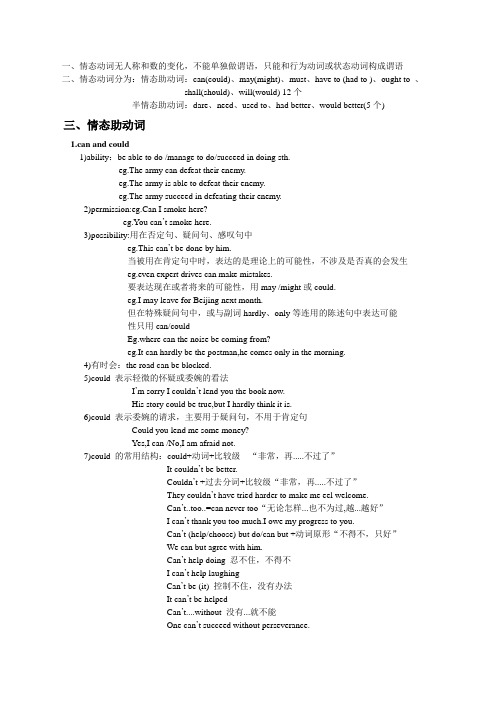
一、情态动词无人称和数的变化,不能单独做谓语,只能和行为动词或状态动词构成谓语二、情态动词分为:情态助动词:can(could)、may(might)、must、have to (had to )、ought to 、shall(should)、will(would) 12个半情态助动词:dare、need、used to、had better、would better(5个)三、情态助动词1.can and could1)ability:be able to do /manage to do/succeed in doing sth.eg.The army can defeat their enemy.eg.The army is able to defeat their enemy.eg.The army succeed in defeating their enemy.2)permission:eg.Can I smoke here?eg.You can’t smoke here.3)possibility:用在否定句、疑问句、感叹句中-eg.This can’t be done by him.当被用在肯定句中时,表达的是理论上的可能性,不涉及是否真的会发生eg.even expert drives can make mistakes.要表达现在或者将来的可能性,用may /might或could.eg.I may leave for Beijing next month.但在特殊疑问句中,或与副词hardly、only等连用的陈述句中表达可能性只用can/couldEg.where can the noise be coming from?eg.It can hardly be the postman,he comes only in the morning.4)有时会:the road can be blocked.5)could 表示轻微的怀疑或委婉的看法I’m sorry I couldn’t lend you the book now.His story could be true,but I hardly think it is.6)could 表示委婉的请求,主要用于疑问句,不用于肯定句Could you lend me some money?Yes,I can /No,I am afraid not.7)could 的常用结构:could+动词+比较级“非常,再.....不过了”It couldn’t be better.Couldn’t +过去分词+比较级“非常,再.....不过了”They couldn’t have tried harder to make me eel welcome.Can’t..too..=can never too“无论怎样...也不为过,越...越好”I can’t thank you too much.I owe my progress to you.Can’t (help/choose) but do/can but +动词原形“不得不,只好”We can but agree with him.Can’t help doing 忍不住,不得不I can’t help laughingCan’t be (it) 控制不住,没有办法It can’t be helpedCan’t....without 没有...就不能One can’t succeed without perseverance.2.may and might1)permission:May I use your pen?Yes,you may./No,you may not.2)Possibility:用于推测,表示不确定,不用于疑问句中She may know Tom’s address.出现I’m afraid.I’m not sure等表示不确定时,常用may/might.I’m afraid he might not come to attend the meeting today.从语气上判断,may表示的可能性比might 大,might更多的表示怀疑He may be very busy now.He might be very busy now.3)用于让步状语从句中However hard you may study,you cannot master English in a month.4)用于祈使句,表示祝愿May you succeed!5)might 常用于表示轻微的责备和委婉的请求You might post the letter for me if you are going near a post box.You might have let me know before!6)习惯用法:may as well do”理所当然,有足够的理由”She may be proud of her sonMay /might (just) as well do=had better do(最好)You might as well stay at home tonight.May/might as well+do A+as+do+B”与其做B不如做A”You might as well throw the money away as lend it to him.One may as well not know a thing at all as know it but imperfectly3.must and have to1)表示义务,一定要,必须You must arrive in good time.The meeting is very important.2)表示肯定性或难以避免,必然会,肯定会All men must die.3)must 表示有把握的推测,一定是,准时Must do/must be doing/must have doneThe tall fellow must be a basketball player.Let’s have something.You must be starving.He must have received mu letter which has mailed last week.4)must 表示非要,偏要,常以第二人称为主语,意指不耐或令人不愉快的事情,用于其他人称,表示主语固执,意为偏偏Why must you buy that car?Jane was never a pleasant young girl.After you gave her your advice,she must goand do the opposite.5)must 的三种否定形式表示不可能must be --can’t be must have done--can’t have doneYou must have met him before.You can’t have met him before.表示不必must do--need not to/don’t have toWe must get up at six tomorrow morning.We don’t have to get up at six tomorrow morning.表示决不能,严禁must--mustn’tYou mustn’t park your car here.6)回答以must提问的句子Must we clean all the rooms?Yes ,you must/No ,you don’t have to/No ,you needn’t7)must 可做名词,表示必须有的东西,必须做的事Warm clothes are a must in the mountains.8)must和have to 表示必须时,有一下差别Must 表示的是说话人主观的看法,而have to则往往强调客观需要The play is not interesting ,I really must go now.I have to work when I was your age.Must 一般只表现在,have to 则有更多的时态。
高中英语 情态动词讲解和练习
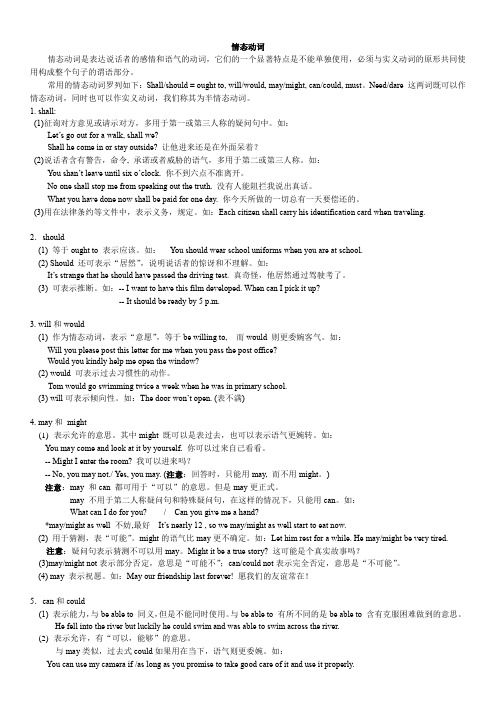
情态动词情态动词是表达说话者的感情和语气的动词,它们的一个显著特点是不能单独使用,必须与实义动词的原形共同使用构成整个句子的谓语部分。
常用的情态动词罗列如下:Shall/should = ought to, will/would, may/might, can/could, must。
Need/dare 这两词既可以作情态动词,同时也可以作实义动词,我们称其为半情态动词。
1. shall:(1)征询对方意见或请示对方,多用于第一或第三人称的疑问句中。
如:Let’s go out for a walk, shall we?Shall he come in or stay outside? 让他进来还是在外面呆着?(2)说话者含有警告,命令, 承诺或者威胁的语气,多用于第二或第三人称。
如:You shan’t leave until six o’clock. 你不到六点不准离开。
No one shall stop me from speaking out the truth. 没有人能阻拦我说出真话。
What you have done now shall be paid for one day. 你今天所做的一切总有一天要偿还的。
(3)用在法律条约等文件中,表示义务,规定。
如:Each citizen shall carry his identification card when traveling.2.should(1) 等于ought to 表示应该。
如:You should wear school uniforms when you are at school.(2) Should 还可表示“居然”,说明说话者的惊讶和不理解。
如:It’s strange that he should have passed the driving test. 真奇怪,他居然通过驾驶考了。
(3) 可表示推断。
- 1、下载文档前请自行甄别文档内容的完整性,平台不提供额外的编辑、内容补充、找答案等附加服务。
- 2、"仅部分预览"的文档,不可在线预览部分如存在完整性等问题,可反馈申请退款(可完整预览的文档不适用该条件!)。
- 3、如文档侵犯您的权益,请联系客服反馈,我们会尽快为您处理(人工客服工作时间:9:00-18:30)。
5.would have done 它表示的是与过去事实相反之假设的结果, 意思是“当时就会…了”而实际上没有… I would have helped you if I had known of your difficulties . If it hadn„t rained yesterday, we would have gone climbing .假如昨天没下雨,我 们就去了。(实际上没有去)。
2.need not have done 没有必要做某事 I need not have got up so early . 我本来 不必要那么早起床的(事实上早已起床) I need not have waited for the train for an hour. 我本来不必要等一个小时的火车。 (事实上已经等了一个小时)
He may / might be sleeping now
疑问句 How could he have forgotten such an important thing?这么重要的事他怎么能忘 了呢? It`s so late. Where can she have gone? 天晚了,她可能去哪儿了呢? Can you have left the watch at home?你 会不会把表丢在家里呢?
3. could have done
它表示“过去本来能够…” 实际上没能做…。 If you could have finished the task in time,you could have been promoted. 如 果你当时能如期完成那任务的话,你可能已 提升了(实际上没有被提升) I could have laughed to hear him talk like that.听他那样讲话,我差点笑出声来。
三.表示必须
ought to/should have to must *have to 能用于各种时态,且有人称和数的变 化. ought to 的否定式为ought not to或者 oughtn‟t to
1.should 和ought to 大多数情况下,含义基本相同,should主要 看主观看法,ought to更多反映客观情况, 在谈到法律,规定,义务时使用。 如:you should try your best to pass the entrance examanations. We ought to go and see hellen,but I think we have no time.
Grammar: Modal verbs
How many modal verbs
do you know?
can could may might shall should must will would ought to
表示推测
modal verbs
不表示推测
have to dare (daren’t) need (needn’t) used to
5. –Look, someone is coming. Guess__________ . --Jack. He`s always on time. A. who can it be B. who he may who it can be C. who he can be D.
6. –I saw Mary in the library yesterday. --You_____ her. She is still abroad. A. mustn`t see B. can`t have seen C. mustn`t have seen D. couldn`t see 7. David, you _____play with the valuable bottle, you_______ break it. A. won`t; can`t B. mustn`t; may C. shouldn`t; must D. can`t; shouldn`t
4.might have done虚拟式表示与过去事实 相反的假没结果。 If she had started a little earlier, she might have been in time for the train.如果 她早点出发,她有可能及时赶上火车。(实际 上没有早出发,便没有赶上火车) It might have been better to stop then. 如果那时就停止的话,也许比较好。
Should “竟然”还可以表示惊讶,出乎意料 的意思 Why should he do such a thing?
2.must与have to 的用法 前者侧重于主观意念,后者则用于表示客观条件 或义务,译为”只好” “不得不” e.g., He must work to make his living. He has to beg for a living.
表示推测
1.一定,肯定 must 一定不,不可能 can‟t, couldn‟t 2.可能 肯定句 may ,might ,could 否定句 may \might not 疑问句 can ,could 都可以 + do sth.表示现在 be doing 表示正在发生的动作 have done表示过去发生的动作
五.其他情态动词用法
1情态动词dare, need 通常用于否定句或疑问句
Who dare do it? Dare you go out alone ? dare, need 还可用作行为动词,可以用于各 种句式,后面可跟加to的不定式 A. who dare do it? B.He dares to do it. A.He needn’t do it B.he needs to do it 上述句子中A句为含情态动词的句子,B句中 dare. need 均为行为动词
注意动词 dare 的某些特殊用法。
固定句型.I dare say. 我敢说.我猜想/以为 Don‟t worry, sir. I dare say, nobody will come again
2.will I. 表现在经常发生的情况. e.g., The man will go to work every day.(= The man goes to work every day 后者更常用) The door won’t open. II.表示“决心”“意愿”“可能”等 e.g If you will come tonight, he’ll meet you, I
2)dare更多的是当实义动词使用, 用法同实义动词一样,
要考虑人称,单复数,时态等。(任何情况都可以dare to
do)
Do you dare to walk in the dark? 你敢黑夜走路吗?
He doesn't dare to tell the teacher what happened that day. 他不敢告诉老师那天发生的事。
think.
This will be the book you are looking for. Will you come in ? (=Will you please come in?)
6. dare 表“勇气”,意为“敢”。用作情态动词时, 只能用于否定句,疑问句和条件句。肯定句中 须用作实义动词。例如: ---Dare you go near the dog? ---No, I dare not/daren’t. If you dare speak to me like that,you will be sorry. 典型错误: The girl dare go out alone at night. 改为 The girl dares to go out alone at night.
4.–What____ it be? --It______ be a mail box, for it is moving.It______ be a car. A. B. can; can; must can; can`t; must C. can; mustn`t; must D. must; mustn`t; can
一定不,不可能 can‟t couldn‟t He can`t be at home. He couldn't have said such a thing .
他们一定不在图书馆读书。 They can`t be reading in the library 约翰是很聪明的,他应该不会叫他儿子那 样做。 John is very clever . He cannot have told his son to do that .
二.表示允许
can, could ,may, might
might,could 表达更客气、委婉、礼貌的请求语气。 Excuse me, could you tell me the way to the bus station? Could you help me? You can go now if you like. May I smoke in the room?
一.Choose the best answers to complete the following sentences: 1. I thought you______ like something to read. So I have brought you some books. A. ought B. might C. could D. must 2. –That man must be Sarah`s husband. --No, he_____ be her husband. She is still single. A. can`t B. mustn`t C. may not D. ought to 3. Peter _____come with us tonight, but he isn`t very sure. A. must B. may C. can D. will
